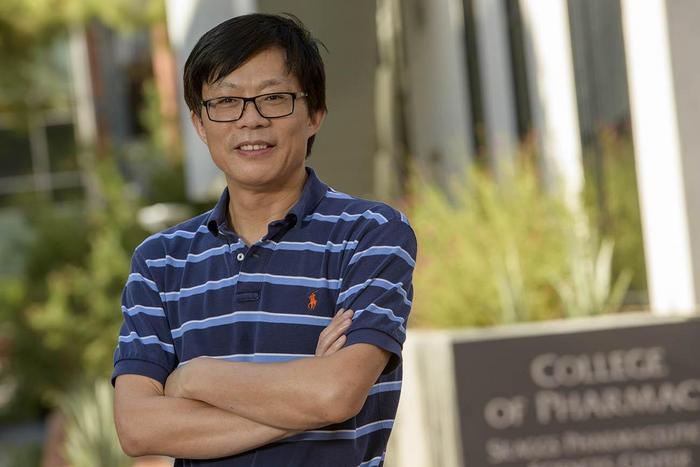Researchers from the University of Arizona Cancer Center have identified a new method of activating specific molecules to target cancer cells while leaving healthy cells unharmed.

Credit: UArizona Health Sciences
Researchers from the University of Arizona Cancer Center have identified a new method of activating specific molecules to target cancer cells while leaving healthy cells unharmed.
In their recent study, published in the Journal of the American Chemical Society, Wei Wang, PhD, and his team developed a new strategy called click-release proteolysis targeting chimeras, or crPROTACs, that allows for the activation and release of PROTACs only in cancer cells.
“The studies open a new way to deliver anti-cancer drugs to cancer cells,” Wang said. “We are exploring the technology for the treatment of more challenging senescent cancer cells and other diseases.”
PROTACs are molecules that scientists designed to break down specific proteins in the body. They are now explored as a potential treatment for cancer; however, one of the challenges is that they can be harmful to healthy cells due to uncontrolled protein breakdown.
Wang’s research focuses on an existing metabolic pathway in the human system, the ubiquitin-proteasome pathway, that normally targets proteins for degradation and recycling. Wang’s strategy uses the pathway to specifically target cells at tumor sites, minimizing premature drug activation and unwanted side effects. The researchers found that the crPROTAC strategy successfully degraded proteins of interest in cancer cells.
“Unlike many other drug delivery strategies, this approach will be very precise in targeting just the tumor,” Wang said.
Wang’s approach stems from biorthogonal and click chemistry, which was originally developed by Carolyn Bertozzi, MS, PhD, for which she won the Nobel Prize in chemistry in 2022.
Wang is a professor at the R. Ken Coit College of Pharmacy’s Department of Pharmacology and Toxicology, co-director of Arizona Center for Drug Discovery, and member of the BIO5 Institute and UArizona Cancer Center. He recently received the inaugural UArizona Cancer Center Research Award for Basic Science for this research and publication.
Wang’s research team from the Wang Lab in the Coit College of Pharmacy included graduate students Mengyang Chang and Devin Pontigon; postdoctoral scholars Feng Gao, PhD, and Giri Gnawali, PhD; and postdoctoral research associate Hang Xu, PhD
Journal
JACS
DOI
10.1021/jacs.3c05159
Subject of Research
Cells
Article Title
Bioorthogonal PROTAC Prodrugs Enabled by On-Target Activation
Article Publication Date
16-Jun-2023
COI Statement
The authors declare no competing financial interest.




